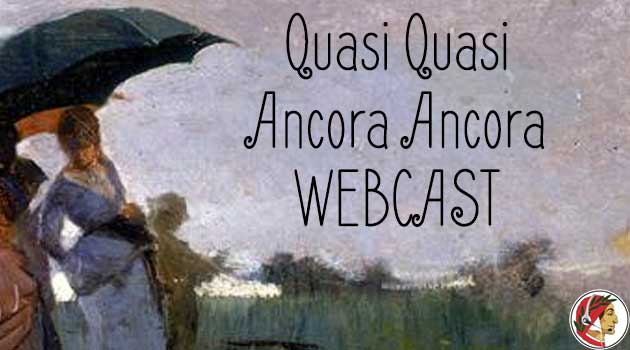Some Italian words, when repeated, change meaning. For example “ancora ancora”…
Webcast
The word ancora, (emphasis on ancora) has different meanings. It can be “again”, “not yet” (as non ancora), “still”, “so far”, depending on the position in the sentence, the situation etcetera.
There is also a very peculiar use of this one and other words: when repeated, ancora ancora, the meaning changes.
We say ancora ancora in contrast to something unacceptable, unbearable, of low quality, to mean that something else is quite acceptable in comparison.
-
Gioco malissimo a calcio, ma a pallavolo ancora ancora me la cavo.
-
Sono vegetariano e non mi piace la carne. Le uova ancora ancora.
-
Ci sono troppi turisti a Venezia in Agosto. A Verona ancora ancora si riesce a camminare.
You should be familiar with the word Quasi. It comes straight from Latin into Italian (and English) and it means “almost”. So, Ho quasi finito, means that I’m almost done and so on. If we repeat it, as quasi quasi, the meaning changes completely. It roughly means “having half a mind to…”, to be tempted to…
-
Oggi fa bel tempo, quasi quasi vado al mare.
-
Ho un po’ di febbre. Quasi quasi non vado in ufficio.
-
Si è fatto tardi, quasi quasi è meglio tornare a casa.
Another one is giusto giusto. Giusto alone means right, correct or just. When we say it twice, it means that something is a perfect match, it fits, is just what I need.
-
Queste scarpe mi vanno giuste giuste.
-
Laura è giusta giusta per Federico.
-
Oggi è una giornata giusta giusta per correre al parco.
]
If you play the piano, perhaps you know it’s an instrument created in Italy. The italian name is pianoforte, meaning “slow and fast” (or “soft and loud”). Piano is an adverb. Corro piano means I run slowly. Piano piano means carefully, very slowly or with a low or slow voice.
-
Se parli l’inglese piano piano, ti capisco.
-
Mia nonna ha 90 anni, ma piano piano va in paese a piedi a fare la spesa.
-
Piano piano, studiando molto, ho imparato lo spagnolo.
Zitto means silent, stare zitto (or zitta) is “to be silent”, sometimes “to shut up”. Zitto zitto is quite funny. We use it when someone does something “behind the curtain”, without drawing attention. We usually put it at the beginning of the sentence.
-
Zitto zitto, Michele ha comprato la casa al mare.
-
Zitta zitta, Laura ha lavorato molto ed è stata promossa.
-
Zitti zitti, i tuoi amici hanno organizzato una festa a sorpresa.
If you want to learn more spoken Italian with a native teacher, book a fre Skype class. Ciao!
Italian painting of today – Cristiano Banti, Passeggiata sotto la pioggia – 1880

